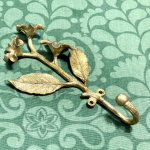On history and its challenges
This weekend feels hectic to me. I feel that I have to force myself to sit down to blog, and now it’s good to be here. Don’t get me wrong; it was a magical week. However, I feel too many lines of thought colliding, too many ideas and too many parallel processes happening in my life. Some were very good, others not so much, especially the situation in Eastern Europe (a year on since the major Russian offensive in Ukraine) and in the UK (issues with access to some fresh food resulting in food rationing) at the moment. I remain hopeful, though, because I am surrounded by people who work towards a better world, collaborate and support each other. It’s good to have a supportive tribe and move forward together.
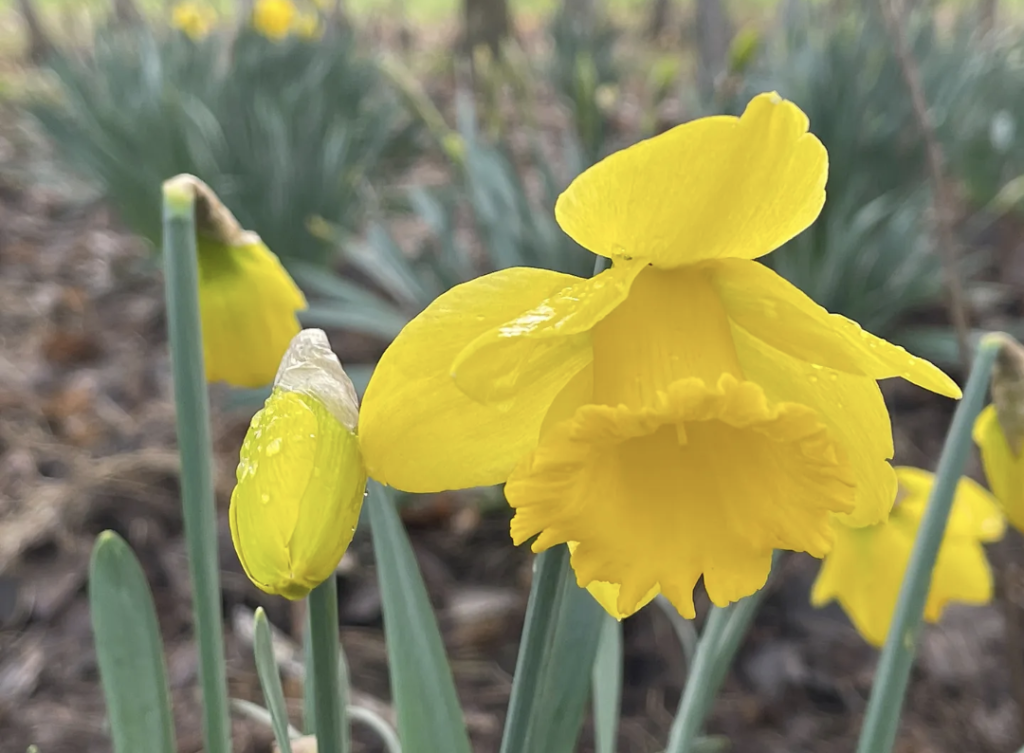
Nature-wise, things are starting to speed up, too. The first daffodil opened up in our local park. While most spring flowers open carefully (we are expecting some cold temperatures next week still), we can already enjoy the first blooming fruit trees, too, and the first little green leaves are slowly opening up. Most spring bulbs planted in autumn are now out, too.
I am late with those, as I am only placing them in pots, allotment beds and front garden soil this week, but that’s okay. Nonetheless, I hope we will enjoy some tulips soon. It is cold, though, so I have some time. I cover the pink strawberries with a plastic cloche to speed them up and to protect them from those temperatures, and sometimes, I still bring my small mimosa in for the night.
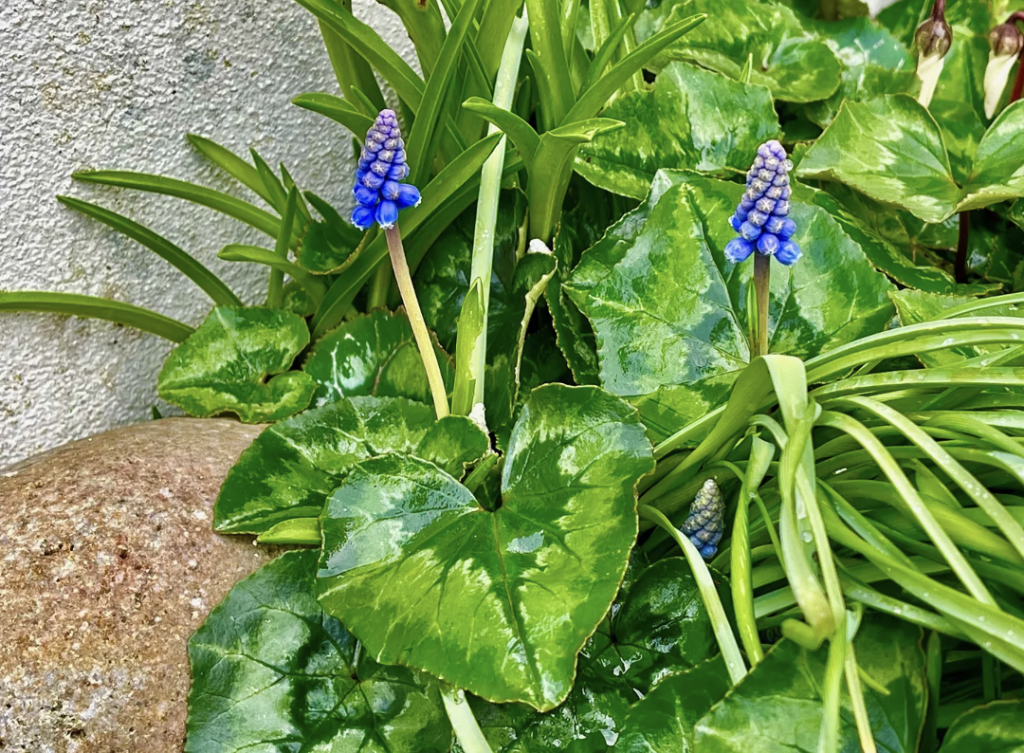
February is the time to continue with heavy jobs and cleaning up, so today, we have burned all the autumn leaves, weeds and branches in the allotment. This leaves me with additional jobs (taking off the last part of the grass and weeds to make space for the last batch of beds), and so I feel the excitement of upcoming weeks. I have a few small goals, and I can easily reach them in my own time, at my own pace, in the sunshine, with my dog and a cuppa.
This is a classic example of a positive psychology approach: effort chosen by us to the level that is hard but achievable is what makes us happy. I know traditionally, we think of happiness as passive rest. However, that is a neoliberal concept designed to programme us into inactivity and consumption. Instead, our minds and bodies actually prefer effort and achievements – as long as they are measured, at the right level, and most importantly, chosen by us (thus boosting our personal agency).
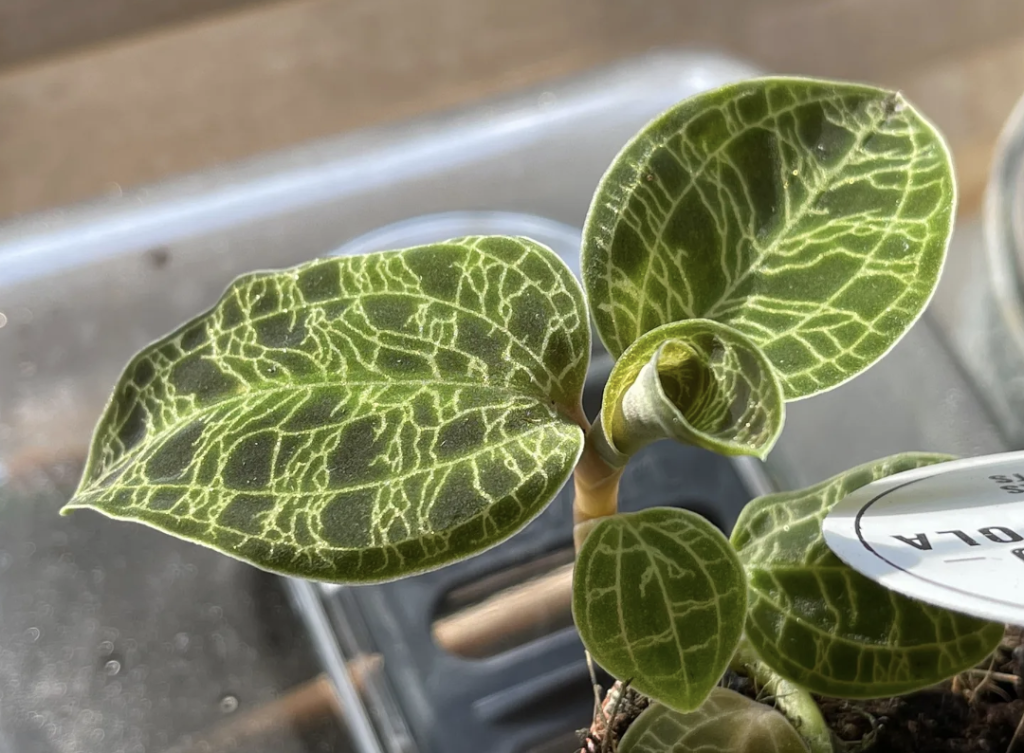
At home, I am sorting up our plants. I have moved most of them to bigger posts and rearranged their access to sunshine – the larger plants are now on the floor, happy, while smaller ones can enjoy direct sunlight. I had to make more space for seedlings and a few small basket plants we got today. Everything has doubled in price since (and because) we have left the EU, so gardening needs to be smarter this year. A small plant that costs £1.50 today will be unavailable in a few weeks, and its larger sibling will cost, well, I guess £5 or more. I usually need 4-5 plants for a pot or a basket, so instead of letting the garden centre grow them for us, I am planting them from that more affordable baby stage this year. We have verbenas and petunias, so the collection should look nice in summer.
Inspired by a few books I read recently, I also added two new plants to my office collection: one is a Kangaroo Paw plant, and the other is an Alba type of Jewel Orchid (which, with its shiny leaves, looks like a plant imported from Avatar’s Pandora planet). And the most exciting news: our new lemon tree grew two blooms, and we cannot wait for those to open now. It’s tricky to grow lemon trees in heated homes, so I am glad she is happy in the cooler window.
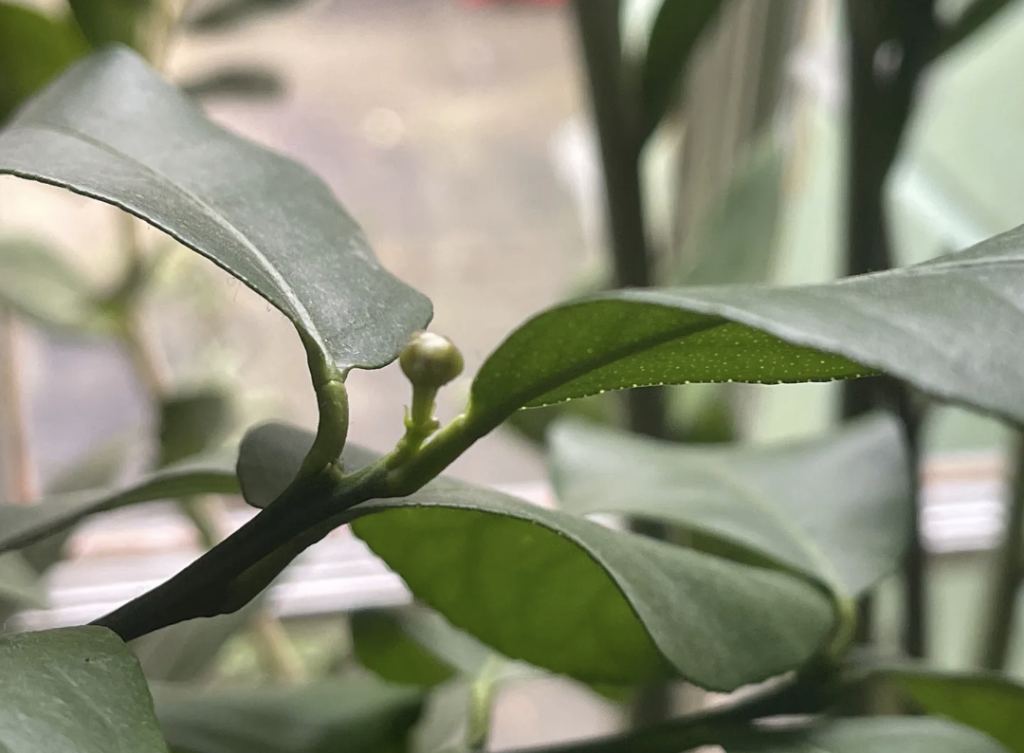
In other news, I am reading a lot about the politics of mental health but also about the politics of gardening. While I am waiting for Alice Vincent’s “Why Women Grow”, I read her first book this week, “Rootbound, Rewinding Your Life”. It’s such an immersive and pleasurable read! Designed like an Almanac following the seasons in chapters representing each month, Alice describes a year of her life when her very linear plans of a happy relationship ended, and she had to rediscover herself before entering a new one. While lost in her own uprooting, Alice rediscovers her own connection with Nature.
What I enjoy so much about this book is its complexity. As it happens, the book events take place in London (mostly) in the year of the EU Referendum, when all of us here felt suddenly uprooted too. Considering it is this week in the UK that the issues with access to fresh vegetables became a reality (with some very valid responses from those who paved the progressive and sensible way in farming in this country), I found this book ever so grounding.
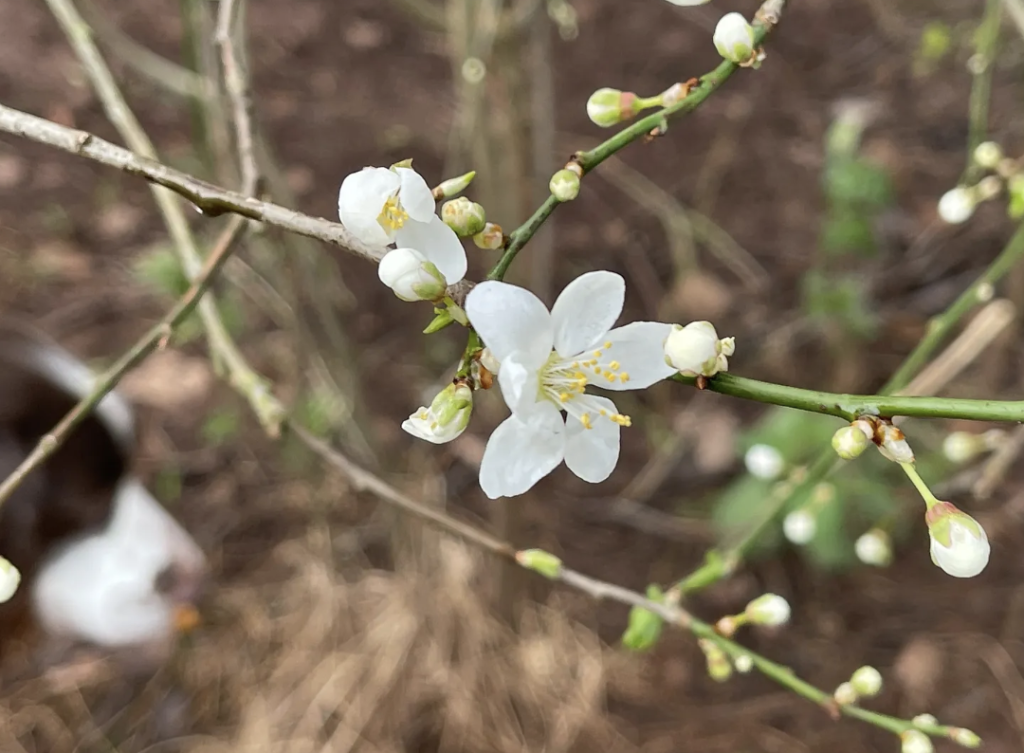
I am also somewhat re-aligning because I have experienced Brexit as the first generation EU immigrant who suddenly found herself almost undocumented (let’s face it, the Settled Status may work on paper, but in practice, behind closed doors, we are asked for British citizenship). Today, as a dual citizen, after the new immigration law allows immediate loss of British citizenship with no explanation whatsoever, I find myself with more rights than most of my friends. Sounds good on paper; again, however, the reality is complex: we all lost something, somehow, for some reason. We all lost something important collectively. Our simple, united-in-diversity plan to collaborate, build and restore ended.
And so, as the remaining part of our country wakes up to the tangible results of that unfortunate vote, reading about the experience of that year from a White, British, London-based young professional opens up yet another perspective. It makes me feel more compassionate. It reminds me how fragile our rights and futures can be. And how when we remain human, connected and aware of the world around us, we may just find a new way through this. There is a powerful metaphor in Alice’s book: the pinching of sweat peas – a drastic move to ensure that instead of one rushed one, they grow many healthier stems. It touched me deeply because this is what happens in Nature, and this is what also happens in our lives. We fall, heal, get up and persevere.
Because we are Nature, we will count our losses, and we will figure it out. We will reconnect. We will find peace.
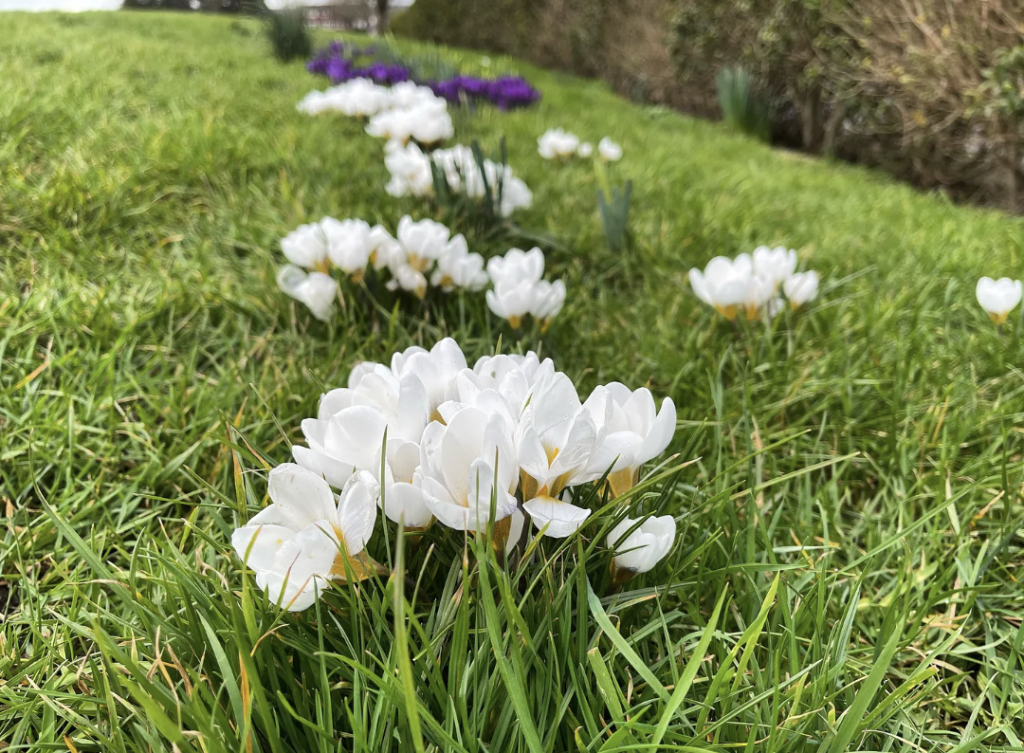
Reflection
This week I invite you to use Nature metaphors for managing life’s challenges and opportunities, as well as choosing new challenges yourself. Practising our agency is incredibly important for managing healthy digital habits, so let’s tap into positive psychology too. Here are a few prompts to get you started:
- Can you think of any Nature metaphors that relate to major challenges in your life? How did you manage those challenges? Can you think of any Nature metaphors that fit both the challenge and your response?
- Can you think of any Nature metaphors that represent how you embrace new opportunities in your life?
- Think about gaming (online, on your smartphone). Think about how you chose the right level of game difficulty. How do you know what level of effort will bring you joy when you complete it? Can you think of your choices in life when you felt like that? When was the level of the challenge perfect, exciting and fun?
(I am off to journal in my new, larger Moleskine – I have too many ideas to fit them on a page smaller than A4. Have a light evening and a soft week ahead).
This post was originally posted on Substack in our Syl’s Liberation Psychologies Newsletter.

